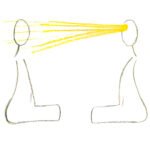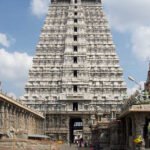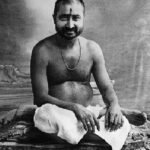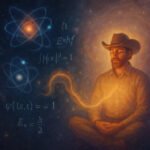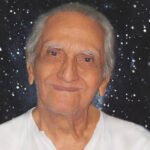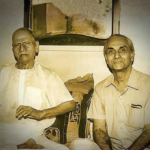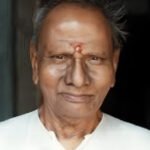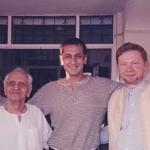April 23, 2018
Science and Spirituality PART 1 – The Illusion of Control in Activities of Life
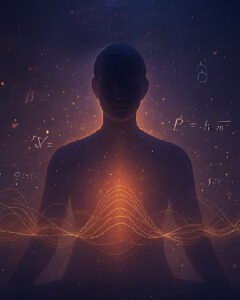
Preface
We often believe we have life under control. Plans are made, things seem to fall in place, and for a while, everything feels certain. But then, something changes, and suddenly, all those plans look a bit fragile.
This thought comes from watching how life moves between what we can do and what we cannot. Science tells us how things function, how one thing leads to another. Spirituality adds another layer, showing that behind all this movement, there is something that cannot be measured.
The more we see how little we control, the more peaceful we become. Effort continues, but with less pressure. We act, yet we also allow. Life feels lighter when we stop holding it too tightly and simply walk with it.
Introduction
We live with a deep-seated belief – “I am the one doing it.” Breathing, walking, thinking, speaking – each action is stamped with a sense of authorship. Yet, when we pause and truly observe, a surprising truth begins to emerge: much of what we claim as ours unfolds without our will, awareness, or intervention. This work – ‘Science and Spirituality: Unveiling The Illusion of Control Through the Activities of Life’ – peels back that illusion, one familiar activity at a time. Each section begins with a relatable, everyday action – something we take for granted. Then, we explore the scientific basis of how it really works, drawing on rigorous research, brain studies, and physiological evidence. Next, we dive into the spiritual lens – drawing from the Bhagavad Gita, the Vedas, the Bible, the Quran, Buddhism, and other timeless traditions – each echoing a quiet but powerful truth: we are not the doers. Finally, we reflect – stepping back to integrate, absorb, and consider what it means to live with this awareness. This specific flow – for example, science, scripture, and reflection – is designed to engage both the intellect and the heart, leading us gradually from assumption to insight, from control to surrender. This is not about giving up life – it is about finally seeing it as it is. Let the journey begin.
1. Breathing – The Uninvited Guest That Never Left
We say, “I am breathing,” as if breath were a task on our to-do list. But do we initiate each inhale? Track every exhale? Do we breathe while asleep because we choose to? Breath comes and goes like an uninvited guest who made itself at home before we ever noticed, and long after we stop paying attention.
Scientific Reference:
Breathing is controlled by the autonomic nervous system, specifically through the brainstem’s medulla oblongata and pons. Even if the cortex (our conscious mind) is asleep, breathing continues. We can influence it briefly – during meditation, singing, or panic – but the moment we stop paying attention, breath resumes its rhythm like a tide going out to sea. Studies on patients in coma and infants in the womb confirm this: breath happens before permission, without direction, and beyond will.
Spiritual Connect:
The Taittiriya Upanishad refers to prana—not as something we generate, but as the life force that moves through us. The Bhagavad Gita (15.14) reinforces this subtle orchestration: “I enter the body and breathe in and out.” In Islamic traditions, Allah is sometimes called Al-Hayy – The Ever-Living – whose breath sustains creation. In many Indigenous traditions, breath is seen not just as air, but as spirit. We are not breathing – we are being breathed. Just as waves do not move themselves but are moved by the ocean, breath too is not an act, but a happening.
Deeper Reflection:
If we don’t author even our breath, what else might we be taking credit for? The illusion of control begins to crack right at the foundation – our very first act in life. Realizing that breath is received, not produced, opens a door to humility. It reminds us that life is not something we do – it is something we are given. To witness breath, rather than claim it, is to begin walking the path from ego to essence.
2. Walking – The Body That Moves Before We Decide
We walk as though we’ve summoned every step with conscious will. But how often have we found ourselves already halfway across the room, with no clear memory of deciding to move? Walking feels intentional, yet it often begins before thought catches up. The legs move, the body flows – and awareness trails behind like a confused narrator.
Scientific Reference:
Walking is governed by central pattern generators (CPGs) in the spinal cord – neural circuits that produce rhythmic movements like walking, even without input from the brain’s higher centres. While the brain may initiate or redirect motion, the execution – muscle coordination, balance, momentum – is largely automatic. Experiments in neuroscience (including studies on cats and humans with spinal injuries) show that walking can persist without cortical instruction, especially in repetitive or habitual environments. We move – and only later claim, “I decided.”
Spiritual Connect:
In Zen walking meditation, practitioners do not “control” walking – they observe it. Steps unfold in awareness, not as a performance, but as a presence. The Bhagavad Gita (3.27) echoes this illusion: “All actions are performed by the gunas (modes of nature); but one whose mind is deluded by ego thinks, ‘I am the doer.’” In Sufism, dervishes whirl not as dancers, but as instruments moved by divine rhythm. Movement, across traditions, is less a doing, more a being moved.
Deeper Reflection:
If even our steps – so deliberate in appearance – begin before our conscious mind arrives, where else might the story of control be unravelling? To witness walking without clinging to authorship is to glimpse a more spacious identity: one that watches, flows, and participates without owning. Walking becomes a metaphor for life itself – not a path we carve, but one we’re carried along.
3. Thinking – The Thoughts That Think Themselves
We say, “I am thinking,” as though we’re seated at the control panel of the mind, selecting each thought like a book from a shelf. But are we really? Thoughts often arise unbidden – interrupting a conversation, drifting in during prayer, narrating while we’re brushing our teeth. They come and go with no clear origin, like guests who let themselves in and rarely knock.
Scientific Reference:
Modern neuroscience reveals that much of our mental chatter originates from the Default Mode Network (DMN) – a set of brain regions active during rest and introspection. This system doesn’t wait for permission – it generates thoughts automatically, often unconsciously. Functional MRI studies have shown brain activity preceding conscious awareness of thought. In one famous experiment by neuroscientist Benjamin Libet, the brain’s readiness potential was detected before participants reported deciding to act – raising powerful questions about free will and thought ownership.
Spiritual Connect:
In Advaita Vedanta, thoughts are seen as natural fluctuations in manas (mind), not expressions of the Self (Atman). The Ashtavakra Gita proclaims with disarming clarity: “You are not the mind, nor the intellect… you are the silent witness.” In Buddhism, thoughts are likened to clouds drifting across the sky – impermanent, impersonal. The Quran reminds us that even our inner whispers are known to the Divine before we speak them. Across traditions, the message is clear: thought happens, but thinking we are the thinkers is the real illusion.
Deeper Reflection:
If thoughts think themselves, then who is the “I” claiming authorship? This inquiry can be unsettling, yet liberating. Realizing we are the space in which thoughts appear, not their source, shifts our posture from grasping to witnessing. We stop trying to edit the storm, and start observing the sky. In that space, peace isn’t found in controlling thoughts, but in not mistaking ourselves for them.
4. Speaking – Words Before Will
“I said it” – we claim, as though words line up obediently waiting for our cue. But haven’t we all said something and thought, “Where did that come from?” Whether it’s a joke that lands perfectly or a comment we instantly regret, speech often leaps out before the conscious mind catches up. Sometimes we listen to ourselves speak and feel more like the audience than the author.
Scientific Reference:
Speech production is a symphony played by multiple unconscious systems – Broca’s area plans the language, Wernicke’s area interprets it, motor cortices execute it, and auditory feedback loops adjust it – all in real-time. Research shows we often begin vocalizing milliseconds before the brain’s conscious centres even register the decision to speak. This lag is tiny but telling. Even emotional tone and word choice can be shaped by subconscious priming, context, or neurological conditioning – far beyond the reach of deliberate will.
Spiritual Connect:
The Bible gently reminds us in Matthew 10:20: “It is not you who speak, but the Spirit of your Father speaking through you.” In the Vedic tradition, speech (Vak) is revered as sacred – not generated by ego, but descending from higher realms. The Rig Veda even maps speech in four levels, with only one – Vaikhari – becoming audible. Buddhism cautions mindfulness in speech not because we’re in control, but because we’re not.
Deeper Reflection:
When we see speech not as something we produce but as something that flows through us, we become more humble and more careful. Language ceases to be a tool for ego-expression and becomes a mirror reflecting the mystery behind the words. To speak mindfully is to honour the silence from which words arise – and to remember that often, silence speaks best of all.
5. Hearing – The Sound That Found You
We say, “I heard that,” like we were out catching sounds with a net. But sounds don’t wait for permission – they arrive uninvited, whether we want them or not. A honking horn, a whispered name, a bird’s call – we don’t choose to hear them. They happen to us. Before we realize it, our attention has already been hijacked by a noise, a melody, or a memory-laced phrase.
Scientific Reference:
Hearing begins before attention. Sound waves strike the eardrum, triggering mechanical, then electrical signals sent through the auditory nerve to the brainstem and auditory cortex. This entire chain starts and completes its first steps before we’re consciously aware. Studies show we process certain sounds, like a baby’s cry or our own name, even in deep sleep or under anaesthesia. Auditory processing is less a decision and more a design – wired to alert, interpret, and often emotionally colour what we “hear,” all without conscious involvement.
Spiritual Connect:
In many traditions, hearing is more than sensory – it is sacred. In the Upanishads, Śruti – that which is “heard” – refers to revealed wisdom, not constructed knowledge. The Quran begins with the command “Iqra” (Recite) – but what is recited must first be received. In John 10:27, Jesus says, “My sheep hear my voice; I know them, and they follow me.” Spiritual hearing isn’t about ears – it’s about openness. True listening, say the sages, is surrender, not effort.
Deeper Reflection:
If hearing occurs before intention, perhaps we are less the choosers and more the receivers of experience. When we realize we’re not the active hunter of sound but the open field where it lands, listening becomes an act of grace. It trains us to receive life instead of grabbing at it. The quieter we become, the more we truly hear – not just others, but that still, small voice within. And maybe, just maybe – that’s the one we’ve been longing to catch all along.
6. Eating – The Hunger That Operates Itself
We say, “I’m hungry,” “I chose this,” “I decided to eat.” But if we pause, we realize: hunger arises on its own. The timing, the craving, even the satisfaction – they’re not as deliberate as we think. We may have noticed how we reach for a snack mid-meeting or lose our appetite in grief. The fork may be in our hand, but something else is setting the table.
Scientific Reference:
Appetite is a neurochemical symphony orchestrated by hormones like ghrelin (the “hunger hormone”) and leptin (the “fullness signal”). These hormones respond to complex signals – blood glucose levels, circadian rhythms, gut microbiota, stress, and even sleep quality. Dopamine circuits drive cravings – often unrelated to nutritional needs but tied to memory, emotion, and habit. Our “choices” at the buffet? Largely pre-scripted by biology and environment.
Spiritual Connect:
In the Bhagavad Gita (15.14), Krishna says, “I enter the body as the fire of digestion” – highlighting that nourishment is not just a mechanical act, but a divine process. Islamic tradition begins meals with “Bismillah” – a recognition that sustenance is God-given. In Christianity, the Lord’s Prayer asks, “Give us this day our daily bread,” not “Let me earn my sandwich.” Across traditions, food is less about control and more about gratitude.
Deeper Reflection:
If even hunger is prompted, not planned – if digestion is received, not driven – then where exactly is our control? Recognizing this shifts our relationship with food from one of dominance to one of reverence. We stop obsessing over calories and start honouring nourishment. Eating becomes an invitation to humility. The body eats; the Self watches. And in that space between bite and being, grace enters quietly – like the taste of something deeper.
7. Feeling Emotions – The Storms We Don’t Call Forth
“I got angry,” “I’m scared” – as if emotions were choices we dialled up like a playlist. Yet emotions often rise unannounced, like storms across a calm sky. A song triggers tears. A smell floods us with nostalgia. A word from someone, and the heart reacts before the head even registers. If we’re honest, we don’t summon emotions – they arrive, fully formed and often uninvited.
Scientific Reference:
Emotions are governed primarily by the limbic system, especially the amygdala, hypothalamus, and hippocampus. Neuroscience shows that emotional responses can precede conscious awareness by milliseconds. For example, fMRI scans reveal amygdala activity in fear responses before subjects are aware they’re afraid. Emotional conditioning – rooted in memory, hormones, and early-life patterns – means we often feel before we think. The body reacts, the mind justifies.
Spiritual Connect:
The Buddha taught in the Satipatthana Sutta, “Just as a guest comes and goes, so do feelings – welcome, observe, and release.” In the Gita (2.14), Krishna says: “O son of Kunti, the appearances of happiness and distress… come and go like winter and summer seasons.” These teachings reflect a deep truth: emotions are not who we are, but what we experience. Non-doership isn’t numbness – it’s witnessing emotion without being consumed by it.
Deeper Reflection:
To see that we don’t author our emotions is to unburden ourselves from shame, blame, and the illusion of mastery. Joy, sorrow, envy, awe – these pass through like weather, not because we choose them, but because we’re open ground. This awareness doesn’t numb us – it liberates us. It lets us feel fully, without craving or aversion. We’re not cold observers – we’re conscious vessels. The storm comes. The storm passes. We remain.
8. Making Decisions – The Choice That Chooses Itself
“I decided.” These words carry the weight of autonomy, as if we single-handedly navigated options, weighed pros and cons, and emerged victorious with a choice. But have we ever changed our mind mid-sentence? Or watched ourselves say yes when everything inside said no? Choices often reveal themselves as déjà vu – already made before we claim them as ours.
Scientific Reference:
Pioneering experiments by Benjamin Libet in the 1980s showed that brain activity (the readiness potential) precedes conscious decision-making by several hundred milliseconds. Later research by Soon et al. extended this gap to several seconds. In essence, the brain initiates a decision before we’re aware of it. What we experience as “making a choice” is more like narrating a decision that has already emerged. Conscious will may be the storyteller, not the scriptwriter.
Spiritual Connect:
The Quran (76:30) echoes this mystery: “You do not will except as Allah wills.” The Mandukya Upanishad suggests that all our waking actions are part of a dream – a projection of consciousness itself. The doer, it seems, is not the originator but a participant, a character caught in a current already flowing.
Deeper Reflection:
If our choices arise before our awareness, what does that say about free will? This doesn’t negate responsibility – it reframes it. Decisions still matter – but perhaps not in the way we thought. The power lies not in control, but in clarity – in watching the choice arise without egoic attachment. When we see that choices choose us as much as we choose them, humility enters. And with it, peace.
9. Working – The Role, Not the Real
We say, “I’m working hard,” as if effort alone proves identity. Our titles – manager, teacher, artist, executive – wrap around us like second skins. But pause mid-task and ask: who is working? Sometimes the body moves ahead, ideas arrive from nowhere, and hours disappear without a trace of self. Who’s truly clocking in?
Scientific Reference:
In neuroscience, this mystery shows up in the study of flow states – periods of peak performance marked by full immersion and a loss of self-consciousness. Research led by Mihaly Csikszentmihalyi and studies using fMRI show decreased activity in the default mode network (the seat of self-referential thinking) during flow. When we do our best work, the sense of “I” fades – the role functions while the ego sits silently in the back row.
Spiritual Connect:
The Bhagavad Gita (2.47) reminds us: “You have the right to work, but not to the fruits of the action.” This isn’t a productivity mantra – it’s a spiritual compass. Work arises from inner impressions (vasanas), karmic seeds planted long ago. The soul doesn’t “do” the job – it witnesses the body-mind playing its part. In Christian mysticism, too, work is seen as service through us, not by us. Identity tied to action is an illusion; we are not the role, we are the awareness behind it.
Deeper Reflection:
When we drop the ego from work, we gain something priceless: freedom. Tasks lose their weight, failures sting less, and success feels less personal – but more joyful. We still work, but with detachment, not indifference, but grace. The moment we see work as expression, not identity, we walk lighter. The actor plays the role well, knowing he’s not the role.
10. Sleeping – The Surrender We Survive Every Night
We often say, “I’m going to sleep,” as if nodding off were a task to be accomplished. But let’s try deciding to sleep, really try. We can create the conditions, lie in bed, close our eyes – but the actual act of sleeping? It slips in like dusk – without fanfare, without conscious command. One moment we’re awake, the next we’re not. We don’t fall asleep. Sleep takes us.
Scientific Reference:
Sleep onset involves a complex interplay of neurochemicals – adenosine buildup, melatonin release, and the gradual inhibition of the brain’s wakefulness centres. This shift is regulated by the hypothalamus and the brainstem, zones that operate entirely outside of conscious control. EEG studies show brainwave shifts from beta to alpha to theta long before awareness fades. Insomniacs, ironically, prove the point: the harder one tries to sleep, the more elusive it becomes. Sleep is not a decision – it’s a surrender.
Spiritual Connect:
The Mandukya Upanishad treats sleep not as a blank void but as a sacred state – a gateway to deeper awareness. In the Bible, Psalm 127:2 says, “He grants sleep to those He loves.” The Prophet Muhammad often ended his day with the phrase, “With Your name, O Allah, I die and live.” And the yogic tradition refers to sleep as a “mini-death” – a rehearsal of ultimate surrender. Each night, without resistance, we vanish into something greater – and return untouched.
Deeper Reflection:
If even sleep – our daily reset – is beyond our will, then what is in our control? The act of sleeping humbles us. It reminds us that life continues not because of our doing, but despite it. Each night, we give up the reins and trust the unseen to hold us. That’s not weakness – that’s faith, coded into biology. To live with this insight is to honour rest not as escape, but as revelation. Sleep shows us that surrender isn’t the end of agency – it’s the beginning of trust.
Conclusion
From the first breath to the final exhale, life unfolds – not by command, but by grace. Science has lifted the veil: what we call the “self” is not the commander, but a commentator – arriving late to narrate what was already in motion. The brain fires, the lungs expand, the mind chatters, the emotions rise – all without our bidding. The ego may claim authorship, but in truth, it’s more mascot than a mastermind.
And yet, this is no reason for despair. Quite the opposite. Every great spiritual tradition – from the Gita’s call to karma without attachment, to the Buddha’s quiet invitation to witness, from the Quran’s deep surrender to the Bible’s echo of divine speech – points to the same luminous truth: we are not the doers. We are the field in which doing happens.
To see this is not to become passive. It is to become peaceful. Non-doership isn’t withdrawal – it is walking, talking, serving, and choosing – without the heavy burden of ownership. It is a return to naturalness, to the intelligence of life that moves like breath: effortlessly, silently, and with purpose unknown to the mind but deeply known to the soul.
The waves never control the ocean. They are simply how the ocean dances.
For any feedback/comments please write to Ramachandran A, Bengaluru, ramcdn@yahoo.com
 Nothing and the Centaur
Nothing and the Centaur Guest Blog – Arunachala Girivalam by Vikrant Rawa
Guest Blog – Arunachala Girivalam by Vikrant RawaMarch 8, 2024
 Guest Blog – The Light of the Guru by Priya Tandon
Guest Blog – The Light of the Guru by Priya TandonOctober 1, 2024

 On The Occasion of Guru Purnima 2025
On The Occasion of Guru Purnima 2025July 28, 2025

 The End of Duality
The End of DualitySeptember 20, 2020
 Advaita and the Energy Body
Advaita and the Energy BodySeptember 14, 2020
 True Apperception
True ApperceptionApril 25, 2019

 The World’s Best Astrologer
The World’s Best AstrologerSeptember 7, 2018
 Nisargadatta and the funeral of death
Nisargadatta and the funeral of deathSeptember 3, 2018
 Ramesh Balsekar – Destiny’s child is 90
Ramesh Balsekar – Destiny’s child is 90May 3, 2018

 Maharaj and the Trojan Horse of Conscious Presence
Maharaj and the Trojan Horse of Conscious PresenceAugust 11, 2015

 Consciousness and the Fenix
Consciousness and the FenixNovember 17, 2011
 Consciousness and the Now
Consciousness and the NowFebruary 2, 2011
 A Double-edged Sword
A Double-edged SwordJuly 3, 2010
 Spending no time with Eckhart Tolle
Spending no time with Eckhart TolleApril 3, 2010


